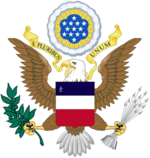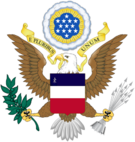Politics of Ibica
Politics of Ibica | |
|---|---|
 | |
| Polity type | Federal presidential constitutional republic |
| Constitution | Ibican Constitution |
| Formation | January 1, 1701 |
| Legislative branch | |
| Name | Congress |
| Type | Bicameral |
| Meeting place | Capitol |
| Upper house | |
| Name | Senate |
| Presiding officer | Rodney Parsons, Vice President & President of the Senate |
| Appointer | Exhaustive ballot |
| Lower house | |
| Name | House of Representatives |
| Presiding officer | Tyson Wescot, Speaker of the House of Representatives |
| Appointer | Exhaustive ballot |
| Executive branch | |
| Head of State and Government | |
| Title | President |
| Currently | Evaline Buckley |
| Appointer | Exhaustive ballot |
| Cabinet | |
| Name | Cabinet of Ibica |
| Leader | President |
| Deputy leader | Vice President |
| Appointer | President |
| Headquarters | Executive Residence |
| Ministries | 14 |
| Judicial branch | |
| Name | Federal judiciary of Ibica |
| Courts | Courts of Ibica |
| Supreme Court | |
| Chief judge | Ward Seward |
| Seat | Supreme Court Building |
| This article is part of a series on the |
| Politics of the United States of Ibica |
|---|
 |
Ibica is a federal republic in which the president, Congress and federal courts share powers reserved to the national government, according to its Constitution. The federal government shares sovereignty with the state governments.
The executive branch is headed by the president and is formally independent of both the legislature and the judiciary. The cabinet serves as a set of advisers to the president. They include the vice president and heads of the executive departments. Legislative power is vested in the two chambers of Congress, the Senate and the House of Representatives. The judicial branch (or judiciary), composed of the Supreme Court and lower federal courts, exercises judicial power. The judiciary's function is to interpret the Ibican Constitution and federal laws and regulations. This includes resolving disputes between the executive and legislative branches. The federal government's structure is codified in the Constitution.
Two political parties, the Conservative Party and the Progressive Party, have dominated Ibican politics since the 1840's, although smaller parties exist such as the Sovereignty Party and the Green Party. Generally, the Progressive Party is also known as the center-left liberal party within Ibica, while the Conservative Party is also known as a center-right conservative party.
State government
States governments have the power to make laws that are not granted to the federal government or denied to the states in the Ibican Constitution for all citizens. These include education, family law, contract law, and most crimes. Unlike the federal government, which only has those powers granted to it in the Constitution, a state government has inherent powers allowing it to act unless limited by a provision of the state or national constitution.
Like the federal government, state governments have three branches: executive, legislative, and judicial. The chief executive of a state is its popularly elected governor, who typically holds office for a four-year term (although in some states the term is two years). All states have a bicameral legislature, with the upper house usually called the Senate and the lower house called the House of Representatives, the House of Delegates, Assembly or something similar. In most states, senators serve four-year terms, and members of the lower house serve two-year terms.
The constitutions of the various states differ in some details but generally follow a pattern similar to that of the federal Constitution, including a statement of the rights of the people and a plan for organizing the government. However, state constitutions are generally more detailed.
Local government
The Ibica has 40,538 local governments, including 1,648 counties, 12,890 municipalities, 7,000 school districts, and 19,000 other special districts that deal with issues like fire protection. Local governments directly serve the needs of the people, providing everything from police and fire protection to sanitary codes, health regulations, education, public transportation, and housing. Typically local elections are nonpartisan—local activists suspend their party affiliations when campaigning and governing.
About 28% of the people live in cities of 100,000 or more population. City governments are chartered by states, and their charters detail the objectives and powers of the municipal government. The Ibican Constitution only provides for states and territories as subdivisions of the country, and the Supreme Court has accordingly confirmed the supremacy of state sovereignty over municipalities. For most big cities, cooperation with both state and federal organizations is essential to meeting the needs of their residents. Types of city governments vary widely across the nation. However, almost all have a central council, elected by the voters, and an executive officer, assisted by various department heads, to manage the city's affairs.
There are three general types of city government: the mayor-council, the commission, and the council-manager. These are the pure forms; many cities have developed a combination of two or three of them.
County government
The county is a subdivision of the state. In most counties, one town or city is designated as the county seat, and this is where the government offices are located and where the board of commissioners or supervisors meets. In small counties, boards are chosen by the county; in the larger ones, supervisors represent separate districts or townships. The board collects taxes for state and local governments; borrows and appropriates money; fixes the salaries of county employees; supervises elections; builds and maintains highways and bridges; and administers national, state, and county welfare programs.
Municipal government
Thousands of municipal jurisdictions are too small to qualify as city governments. These are chartered as towns and villages and deal with local needs such as paving and lighting the streets, ensuring a water supply, providing police and fire protection, and waste management. In many states, the term town does not have any specific meaning; it is simply an informal term applied to populated places (both incorporated and unincorporated municipalities). Moreover, in some states, the term town is equivalent to how civil townships are used in other states.
The government is usually entrusted to an elected board or council, which may be known by a variety of names: town or village council, board of selectmen, board of supervisors, board of commissioners. The board may have a chairperson or president who functions as chief executive officer, or there may be an elected mayor. Governmental employees may include a clerk, treasurer, police and fire officers, and health and welfare officers.
Campaign finance
Successful participation, especially in federal elections, requires large amounts of money, especially for television advertising. This money is very difficult to raise by appeals to a mass base, although in the 2008 election, candidates from both parties had success with raising money from citizens over the Internet. Both parties generally depend on wealthy donors and organizations—traditionally the Progressives depended on donations from organized labor while the Conservatives relied on business donations. This dependency on donors is controversial, and has led to laws limiting spending on political campaigns being enacted. Opponents of campaign finance laws cite the Constitution's guarantee of free speech, and challenge campaign finance laws because they attempt to circumvent the people's constitutionally guaranteed rights. Even when laws are upheld, the complication of compliance requires careful and cautious drafting of legislation, leading to laws that are still fairly limited in scope, especially in comparison to those of other countries.
Fundraising plays a large role in getting a candidate elected to public office. Without money, a candidate may have little chance of achieving their goal. In the 2004 general elections, 95% of House races and 91% of senate races were won by the candidates who spent the most on their campaigns. Attempts to limit the influence of money on Ibican political campaigns dates back to the 1860s. Recently, Congress passed legislation requiring candidates to disclose sources of campaign contributions, how the campaign money is spent, and regulated use of "soft money" contributions.
Elections
Unlike in some parliamentary systems, Ibicans vote for a specific candidate instead of directly selecting a particular political party. With a federal government, officials are elected at the federal (national), state and local levels. On a national level, the president, is elected directly by the people, through a nationwide popular vote.
Various federal and state laws regulate elections. The Ibican Constitution defines (to a basic extent) how federal elections are held, in Article One and Article Two and various amendments. State law regulates most aspects of electoral law, including primaries, the eligibility of voters (beyond the basic constitutional definition), and the running of state and local elections.